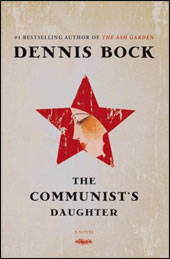 I remember reading all about the advance and/or the sale of Dennis Bock’s first novel, The Ash Garden. And when I read the novel, I was completely taken by not only the story but his writing as well. But then, The Communist’s Daughter, despite how much I enjoyed the first novel, sat on my shelves for years and years and years. So I’m glad that I’m reading in alphabetical order because this novel probably would have sat on my shelves for another many years without it.
I remember reading all about the advance and/or the sale of Dennis Bock’s first novel, The Ash Garden. And when I read the novel, I was completely taken by not only the story but his writing as well. But then, The Communist’s Daughter, despite how much I enjoyed the first novel, sat on my shelves for years and years and years. So I’m glad that I’m reading in alphabetical order because this novel probably would have sat on my shelves for another many years without it.
Years ago, I felt very Canadian as I watched on the CBC or some such, Donald Sutherland’s starring role as Norman Bethune. Who knows why, but in my romantic youth I was obsessed with Bethune. Perhaps I had always dreamed of communist doctors fighting for the good cause in faraway places. Perhaps I had idealized the idea of the Spanish Civil War in terms of all the great minds that participated in the cause. All of this is to say that I’m much older now. No longer a wide-eyed innocent, I enjoyed Bock’s portrayal of Bethune in this novel, even if, as anyone know who reads this blog, the format (it’s epistolary) drove me bananas.
The novel opens with a series of letters, each in a different ‘envelope,’ written on old typewriter with a mocked up old ribbon to Bethune’s daughter, whom he has never met. Born in Spain to his Swedish lover, the girl’s mother passed away in tragic circumstances, leaving Bethune bereft but not dissuaded from his cause. When he begins his tale, truly a record of his life, loves and losses, for his daughter, Bethune’s in China attempting to shore up battlefield surgeries, improve their frontline medical conditions and teach the masses about not only blood transfusions but also the fundamentals of Western hospital care. Struck with tuberculosis while a younger man, his lungs are troubled now and his health is failing. Before he finishes, he needs to tell his daughter everything about his life, from beginning to end, and the narrative skips back and forth from Canada to China, from Spain and the oceans in between.
Bock’s Bethune stands solid by his principles and doesn’t waiver, even from a young age suffering under a dogmatic preacher of a father. There are times when he acts selfishly but it’s always in service of the greater good, whether it’s divorce from his first wife or forcing a member of his China team out because of his drinking. In a way, his persistence to his cause remains the most interesting aspect of Bock’s characterization of Bethune — it’s both a blessing and a curse, and while he lives long enough to regret certain parts of his life, especially not knowing his daughter, and yet it’s not enough to draw him away from the work. Bock is a literary writer of the highest calibre. There are times when I’ve been hyper-critical of the literary fiction genre lately, which isn’t necessarily a fault of the writers or the writing, but more so the culture in which these books are published. A lot are over-written, obviously so, and are in need a good editor to take red pen to the margins screaming, “really? REALLY? ANOTHER FLAPJACKING METAPHOR.” Now, all of this is to say that despite my misgivings about what I call literary fiction lately I could not put this book down. I read it inch by inch and cover to cover, which is no mean feat considering how tired and busy I am.
Annywaay, as per usual, I’m rambling. Let’s just go to bed saying that I’m so pleased that writers like Dennis Bock are working in Canada today, celebrating our heroes, writing back to them, taking them to task, but always, always respecting them in a way that feels utterly right.